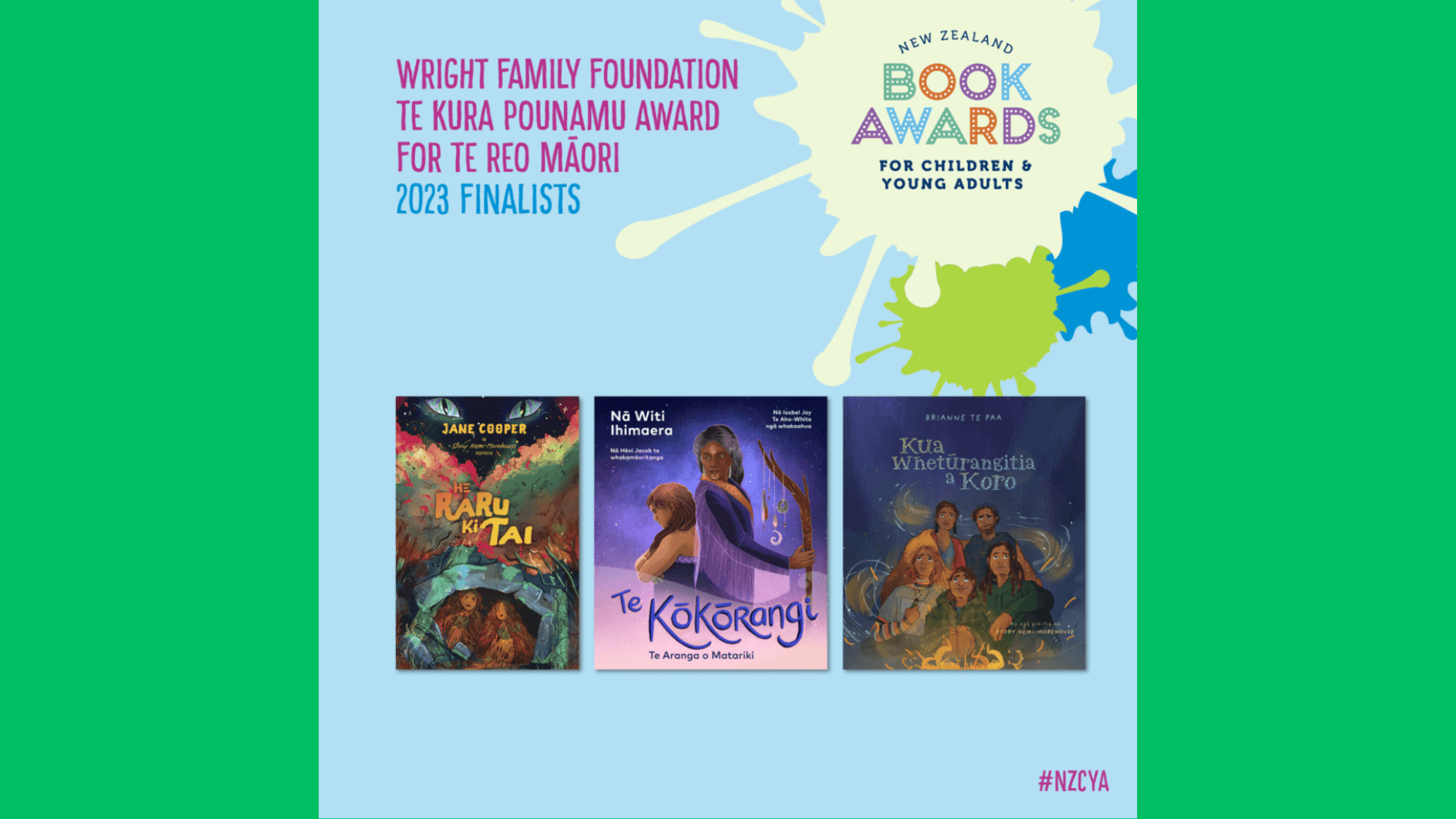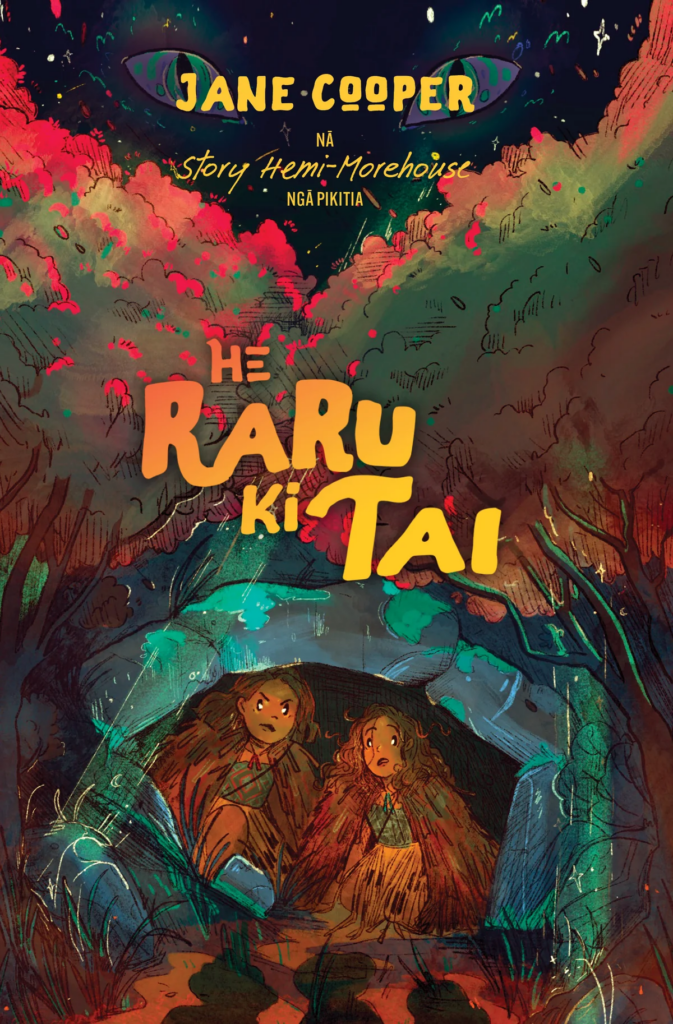Here at The Sapling, we always love a good behind-the-scenes look into our favourite books. So, as part of our coverage of this year’s NZCYA Awards, we’ve asked the authors of the Te Kura Pounamu Award finalists to spill the story behind their stellar books!

Te Kōkōrangi, by Witi Ihimaera and Hēni Jacob
Tēnā koutou katoa,
A children’s author is always looking for heroes or heroines whom they can write stories about. When I was researching my last adult book, Navigating the Stars (2020), I came across such a heroine, Hineteariki, who was the first female astronomer I discovered in our pūrākau. She became Te Kōkōrangi in my children’s book and around her I wove the story of four apprentices who, when she is captured by an evil chief, must take over the rituals to ensure the rising of the Matariki stars.
One of the apprentices is a young girl named Ariā and, now, she has captured my imagination! So I have written a second book, Ariā and the Kumara God, which continues the saga. In this story, the four apprentices have to get to Whānui, the star associated closely with the Matariki constellation. How does she do that? You will have to wait for next year to see! And by the way, there will be a third book about Te Kōkōrangi and Ariā rising over the horizon as well.
A children’s author is always looking for heroes or heroines whom they can write stories about
The other inspiration for Te Kōkōrangi was that I was so happy to see how Aotearoa New Zealand had taken Matariki to our hearts and, also, that so many young children are going to schools that teach te reo! How good is that? I wanted to celebrate those two occasions too. In the old days people would offer up karakia to the stars so I wrote Te Kōkōrangi as my offering, in te reo, to them seeking our future prosperity and happiness.
I want to show that certainly pūrākau from Aotearoa are as thrilling and as exciting as any from Greek legends, having our own great heroes and heroines
And, as I mentioned earlier, I am planning a trilogy of books, which conforms to my kaupapa of always putting the past before us. I want to show that certainly pūrākau from Aotearoa are as thrilling and as exciting as any from Greek legends, having our own great heroes and heroines.
Ma te Atua koutou e manaaki,
Witi Ihimaera

Te Kōkōrangi: Te Aranga o Matariki
Nā Witi Ihimaera
Nā Hēni Jacob te whakamāoritanga
Nā Isobel Joy Te Aho-White ngā pikitia
Penguin Random House
RRP: $25.00
Kua Whetūrangitia a Koro, written by Brianne Te Paa and illustrated by Story Hemi-Moorehouse
Matariki, Motivation and Reo Māori
The spark of writing my first reo Māori children’s book, Kua Whetūrangitia A Koro, ignited during a Reo Wananga in 2019 while I absorbed the teachings of Professor Rangi Matamua. His kōrero on Te Waka o Rangi, Taramainuku, and the significance of calling out our loved ones’ names during Matariki’s rise kindled my imagination.
As I listened, a story unfolded within me. I envisioned a child grappling with loss, trying to honour customs alone and becoming the sole guardian of Matariki knowledge in their whānau. This resonated deeply, as I had been unaware of these customs before Professor Rangi’s kōrero. I realised others might be in the same position, with children often surpassing previous generations’ understanding of Matariki due to improved access to Mātauranga Māori.
I envisioned a child grappling with loss, trying to honour customs alone and becoming the sole guardian of Matariki knowledge in their whānau
However, I hesitated to write a children’s book. Doubt consumed me, as I lacked knowledge about the writing process, manuscript formatting, and publishing. So, for two years, the idea remained dormant within me. The fear of someone else bringing my inspiration to life finally propelled me forward.
I wrote How My Koro Became A Star and shared it during a Matariki presentation with colleagues. Encouraged by their response, I stepped into the unknown and sought publishers. Surprisingly, a social media video of me reading the story gained traction, catching the attention of Huia Publishers, who urged me to write it in te reo Māori and enter it into the Storylines Te Kahurangi Kāterina Te Heikōkō Mataira Award.
Initially hesitant due to self-doubt, I realised that writing in te reo Māori was a testament to the efforts of my reo Māori teachers. It was an acknowledgment of their dedication in preparing me for endeavours like this. To not believe in my own ability would be a disservice to them and the language. So, I took on the challenge.
A social media video of me reading the story gained traction, catching the attention of Huia Publishers, who urged me to write it in te reo Māori
With determination, I crafted the manuscript, Kua Whetūrangitia Tōku Koro, preserving the rhyming style and storyline of its English counterpart. During the editing process, the title transformed into Kua Whetūrangitia A Koro.
As I reflect on this journey, I find myself experiencing a rare sense of pride. I am proud that I overcame the doubts that plagued my reo Māori writing ability and produced a meaningful story. Kua Whetūrangitia A Koro stands as a testament to the power of inspiration, perseverance, and belief in oneself.
Brianne Te Paa

Kua Whetūrangitia A Koro
Nā Brianne Te Paa
Nā Story Hemi-Morehouse ngā pikitia
Huia Press
RRP: $22.00
He Raru ki Tai, by Jane Cooper
He Raru Ki Tai was written in 2019, when I was teaching the tuākana rumaki reo class at Te Rehu/Westmere School. Over many decades, the Ministry of Education has produced engaging publications in Māori for kura, but there are to date few te reo novels or novellas for senior primary/intermediate students to study, and nothing set in pre-Pākehā Tāmaki Makaurau. The exception would be the retelling of the pūrākau, Ponga rāua ko Puhi-huia, which appeared in a 1960 edition of Te Whare Kura edited by Hoani Waititi. So I decided to challenge myself to write a te reo novella for my students—an adventure story set in 17th-century Tāmaki Makaurau.
The Ministry of Education has produced engaging publications in Māori for kura, but there are to date few te reo novels or novellas for senior primary/intermediate students to study, and nothing set in pre-Pākehā Tāmaki Makaurau
Having often taken students on field trips to the tūpuna maunga and the lava-encrusted foreshores of the Waitematā and Manukau Harbours, it was appealing to set the novella in places I know. During those visits, students showed an interest in the historical narratives and meanings of Māori place names handed down in the oral traditions of Tāmaki mana whenua. These revive the Māori cultural landscape, for so long buried beneath the layers of English urban heritage or quarried out of existence.
One weekend while walking around the Ōtuataua Stonefields, I looked across the Harbour to Pūponga Point and started thinking about the pūrākau which relates to the slaying of Ureia, the
Hauraki guardian taniwha. It struck me that I could use the essential plot of that pūrākau for my novella, but fictionalise the main characters and create conflict through the protagonists’
rejection of the plan devised by members of their hapū to kill a taniwha.
Having often taken students on field trips to the tūpuna maunga and the lava-encrusted foreshores of the Waitematā and Manukau Harbours, it was appealing to set the novella in places I know
In order to describe aspects of the material culture of 1600s Tāmaki Makaurau, I tried to ensure that I used the correct kupu in relation to horticulture, timekeeping, clothing etc. I had to avoid transliterations, but above all I wanted to keep the writing pacy and suspenseful.
He Raru ki Tai won the 2021 Storylines—Te Kahurangi Kāterina Te Heikōkō Mataira award, under an earlier title, Ureia, and was therefore eligible for publication by Huia Publishers. It was released in 2022. Huia suggested that I write an English translation of the novella, which was also published that year as To Trap A Taniwha.
Jane Cooper




